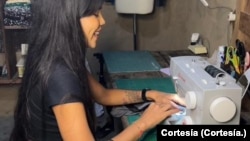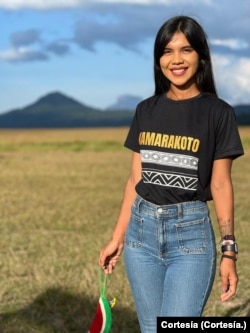Driven by her passion for sustainable fashion and her Pemón community, Venezuelan Corina Landaez has dedicated herself for a few months to teaching sewing classes in these indigenous areas with the aim of teaching young women to create their own clothing and also to take care of themselves. the environment through clothing.
A couple of months ago, the 28-year-old Venezuelan went viral on social networks by showing her origins and her work, teaching sewing classes and teaching the importance of recycling clothing in the Pemón ethnic group.
Thanks to his work, he has a large community on the social network Instagram, where he has 218,000 followers.
“Teaching others my knowledge fills my heart and with their looks full of hope they motivate me to want them to learn faster so that they can also create, dream, and be masters of their lives. May this job encourage you to be what you want to be. Because the I appreciate it very much and I want us all to be prosperous,” he commented to the Voice of America.
The Pemón ethnic group, of which Landaez is a part, is a Venezuelan indigenous community that lives in the Gran Sabana and the Canaima National Park, in the state of Bolívar. The Pemones are divided into three groups: Arekuna, Taurepán and Kamarokoto.
All Pemón people preserve the language (Pemón) and the culture of their ancestors thanks to the fact that they are within a protected tourist area that has wonders such as Angel Falls, the highest waterfall in the world.
Although their ancestral costume is the guayuco, a garment made up of two pieces of red cloth attached to the waist and a piece that covers the breasts (in the case of women), they currently only use it for ceremonies. In their daily lives, the Pemones have adopted the use of dresses, skirts, pants and shirts, as well as moriche sandals that they make themselves.
Its beginnings
Corina Landaez was born in the state of Guárico, but was legally presented in the state of Anzoátegui. He lived his childhood between Delta Amacuro, Bolívar and the Kamarata Pemón community, from which his mother is from.
“I lived in other states as I grew up, like Yaracuy, Táchira, Nueva Esparta and at times in Zulia, Barinas, Caracas, because I went from here to there and from there to here. To wherever my dad was and always returning to my little town where my indigenous Pemón mother from Kamarata is. In short, I have Pemón blood for my mother, and for my father who went from one extreme to the other, I feel like I belong to all of Venezuela,” explains the young woman.
Her constant changes of city did not prevent the Venezuelan from discovering early that sewing was her passion. She did it when she was a teenager, thanks to a cousin who is a fashion designer and inspired her.
“I saw her as independent, owner of her workshop in Caracas, owner of her time, and I really liked to think that I could express my creativity through clothing. In reality, all my Landaez cousins are for me the greatest inspiration I have in the world. They are women who burn their eyes working and studying and, therefore, stable and successful. They are my example to follow,” he says.
Landaez learned to sew while living alone in a dorm. At that time, he was studying Business Administration and also worked long hours, although he later stopped studying because work consumed too much of his time.
“When I decided to learn to sew, knowing how expensive it would be because of all the tools you need for this trade, I knew it would be difficult, but I planted it in my mind that I would learn to sew just because and I would do everything I could.” .
Despite the adversities, the young woman comments that she began her teaching process self-taught. I would arrive from work early in the morning and download the sewing videos that I had previously searched for at a place where they rented computers with internet.
“I started watching the videos because I had a television and a device with a USB port in the room. That’s how I studied even without having sewing machines or anything. Not a thread. It was me showing myself that I would do everything possible to learn,” he points out.
Throughout her training process, she affirms that her family played a key role because they always supported her. It was one of her aunts who gave her her first sewing machine, while her cousins provided the first fabrics and sewing tools.
“My family has always supported me. They are a very important pillar for me. Without them I would literally be nobody. “My aunt tells me that I should give myself credit because even though they gave me my sewing machine to start with, I was the one who did my part to learn even if I didn’t have the financial means,” he mentions.
Sewing with purpose
Now that Corina Landaez teaches sewing classes in the indigenous community, she tries to convey to her students the importance of recycling clothes and also of using every last piece of fabric when making, so that nothing is lost and they do not contribute more pollution to the environment.
Landaez helps girls and women in the community make everyday garments, such as underwear, dresses, skirts and shirts. All of this, in many cases, with recycled fabric.
“Clothes are to be worn according to your need. I understand that custom-made clothing is more expensive and that is why people go to buy fast fashion, knowing that the price they save has a high cost in the labor of those who make those clothes at gift prices. That’s why I teach how to sew, so that you can do what you like yourself, or use my patterns and have it made with your trusted seamstress,” she explains.
For the Venezuelan, providing this type of teaching in the Pemón ethnic group fills her with great joy. He affirms that his community is a family.
“Wherever I go, even if I feel like I don’t know anyone, just for saying that I am Pemón, they start looking for my family tree to finally say that they are my family. Or if not, just because I am Pemón, I am already part of them and they receive and shelter me as if I were really their sister, daughter, aunt, cousin… They are my family,” he expresses.
Thanks to its large community on Instagram, Louza has a window to show the benefits of the Pemon people, highlight their customs and make them visible to the rest of Venezuelan society, something that has also been achieved thanks to the increase in tourism in Canaima, where it is located. Pemón ethnic group is of utmost importance.
The current struggle of the Pemona community is to stay away from illegal mining. In this sense, Clima 21, the Venezuelan Observatory of Environmental Human Rights, presented a report in 2022 in which it showed the impact of illegal mining in Canaima, mainly on the Pemón people who are affected by the appearance of diseases such as diphtheria, measles, yellow fever and malaria.
Additionally, the report highlights that 35% of indigenous people in the Canaima mining area presented mercury levels higher than those established by the World Health Organization. It should be noted that only 30% of the inhabitants of Pemón towns are miners.
Your plans
The sewing classes in her community and her learning process have made her understand that she is passionate about this art. That is why she wants to merge both activities on her YouTube channel, where she can upload cooking content and these videos help others, who likewise do not have the resources to attend an academic center.
“I would like to be able to merge both activities on my virtual YouTube platform. Where I can be happy sewing and at the same time taking classes so that others can also learn to make their own clothes. With the freedom of being able to work like this from anywhere in the world,” he details.
As someone who grew up in various parts of the country, Landaez defines herself as an adventurer. That is why in addition to sewing, she also dreams of continuing to know beyond the Venezuelan borders. ”This life is ephemeral and I want to be the happiest that life allows me to be, doing what I like and teaching others,” he concludes.
Connect with the Voice of America! Subscribe to our channels YouTube, WhatsApp and to newsletter. Turn on notifications and follow us on Facebook, x and instagram.

















Add Comment